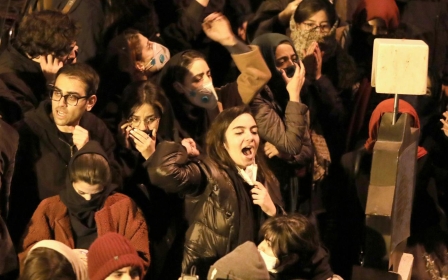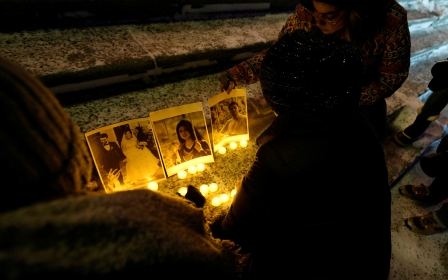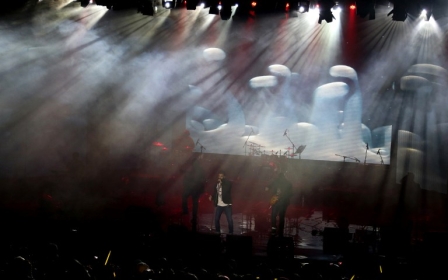Iranian press review: Media apologise for misleading public following downing of plane

Iranian media issue historic apology
For the first time in the history of the Islamic Republic of Iran, news agencies and dailies have apologised to the public for having been misled by the country’s military and political elite, and denounced the authorities for their attempts to conceal the truth about the downing of a Ukrainian plane.
The media’s unprecedented move came about following days of confusion over how a Ukrainian International Airlines passenger plane crashed near Tehran on 8 January, killing all of its 176 passengers, including many Iranians.
The crash happened hours after the Islamic Revolutionary Guard Corps (IRGC) carried out missile attacks on two bases in Iraq hosting US troops, but the IRGC had immediately denied any connection between the attacks and the plane crash.
However, two days later, the IRGC admitted that the plane was hit by its air defence system missiles as a result of human error.
New MEE newsletter: Jerusalem Dispatch
Sign up to get the latest insights and analysis on Israel-Palestine, alongside Turkey Unpacked and other MEE newsletters
The delayed admission of responsibility led to harsh condemnation from Iranian dailies and news agencies, which due to the country’s restrictive media policies can hardly ever criticise the IRGC’s actions and its commanders’ decisions.
On 11 January, IRNA news agency, the country’s state-run official news agency, published a statement apologising to Iranians for the false information they had presented to their audience about the downing of the plane.
“All of us at the Islamic Republic News Agency apologise for unintentionally being the means to transmit false news to our audience,” the statement read.
On the same day, the semi-official ISNA news agency, under the headline “By insisting on [giving] wrong information, trust has been damaged,” issued an apology and warned the authorities that after this incident, Iranian media would be the “loser of any media war” with foreign broadcasters.
The condemnation of Iran’s military commanders and political leaders has not been limited to news agencies, whose main audience is journalists.
On 12 January, the Iran daily covered its front page in black as a sign of mourning and splashed a one-word headline - “Shame” - with texts aligned in the shape of an airplane tail.
“Human error might not be avoidable in a war or during a crisis,” wrote Iranian academic Ali Akbar Ghazizadeh in an opinion piece for the paper. “But we would make an even bigger mistake if we do not inform the public about that error and if we do not tell them the truth.”
The Hamshahri daily, which enjoys one of the highest circulations in the country, also chose only one word for its front-page headline on Sunday: “Unpardonable.”
Artists boycott Fajr festivals
A group of Iranian artists have announced their decision to withdraw from the annual Fajr festivals, denouncing the accidental downing of a Ukrainian plane by the IRGC.
Considered Iran’s most prestigious art event, the international Fajr festivals take place every year in commemoration of the 1979 revolution, during which artists compete in a variety of categories including cinema, theatre, music and visual arts.
This is the second time in the festivals’ history that artists have withdrawn their participation. The last boycott was in 2009 during the aftermath of the controversial presidential elections, which led to the re-election of Mahmoud Ahmadinejad.
Following the Ukrainian plane tragedy, director Masoud Kimiai and documentary filmmaker Mitra Ebrahimi removed their movies from the competition section of Fajr Film Festival.
On 12 January, a statement signed by 43 cartoonists went viral on social media announcing their withdrawal from the Fajr Visual Arts Festival in condemnation of Iranian authorities’ “unreasonable conduct”.
“Until the time when truth-hiding doesn’t exist, we will not have delight in this country, as the current ways will only lead to one catastrophe after another,” the cartoonists’ statement said.
Actor Fatemeh Motamed Arya and playwright Naghmeh Samini withdrew their play from competing in the Fajr International Theater Festival. “We go silent in respect to the women, men and children of our homeland, whom we lost on these days,” they wrote in a post on Instagram.
Musician Keyvan Saket also told his followers on Instagram that “in a sign of sympathy with the mournful and oppressed people of my country, I will not participate in any Fajr festival”.
Meanwhile, the board of directors at Ab Anbar art gallery announced that they had suspended all future activities. “Continuing our artistic activity at this time means that we are ignoring all that has been happening during the past days.”
MPs disqualified for upcoming elections
Iran’s conservative Guardian Council, in a second round of vetting, have disqualified 90 incumbent legislators - mainly from the reformist camp - who had registered for the country’s parliamentary elections in February.
The Guardian Council, whose 12 members are appointed directly and indirectly by Iran’s supreme leader, is responsible for examining the political and religious eligibility of candidates who enter any election in the country.
The council will carry out a third round of vetting before next month’s elections, in which many observers believe the hardliners will emerge the winners.
On Monday, Hamshahri Online reported that the disqualification of incumbent lawmakers was based on suggestions by the intelligence ministry.
However, it did not provide details on the reasons the security entities had given to the Guardian Council which led to the rejection of the 90 MPs.
Mohammad Reza Tabash, a reformist lawmaker who has been a member of the Iranian parliament since 2000, is one of the prominent figures disqualified from the race.
Ali Motahari and Mahmoud Sadeghi, the two vocal critics of Iran’s governing system, are also among those who’ve been barred from defending their seats in the next elections.
Motahari, in a short piece published by ISNA news agency, said he’d been informed that his disqualification was based on a “lack of actual commitment to the Islamic Republic order”.
Mining deaths on the rise
The number of deaths among miners has been on the rise due to work accidents, according to Iran’s Labour News Agency (ILNA).
One miner died on 12 January in a coal mine near the city of Tabas, and on 9 January, another miner died and four were injured in a separate accident in the Hamkar coal mine near Ravar, in Kerman Province, ILNA reported.
“The miners are paying the price of the owners’ greed,” ILNA wrote in an investigative piece about the recent fatal accidents in mines across the country.
“Certain mines, no inspector has ever been to. The owners and contractors in these mines skimp on expenses of work safety measures so that they can make more profit,” ILNA said.
ILNA did not provide detailed statistics on the number of annual deaths or accidents in Iranian mines, but underlined that most accidents occurred due to walls collapsing and accidental explosions.
Middle East Eye delivers independent and unrivalled coverage and analysis of the Middle East, North Africa and beyond. To learn more about republishing this content and the associated fees, please fill out this form. More about MEE can be found here.




